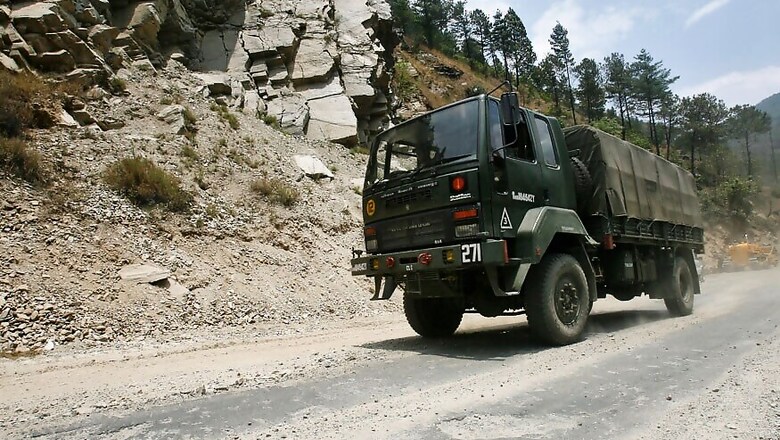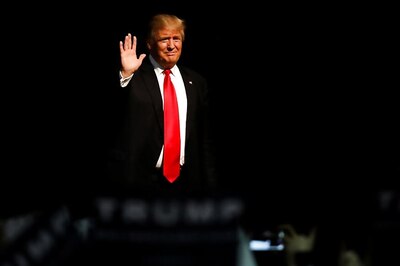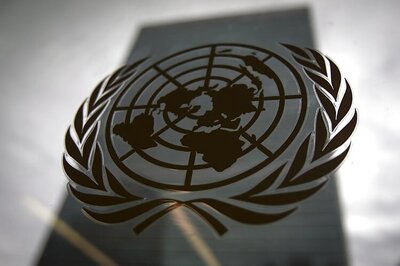
views
Beijing: Dismissing as "untenable" India's assertion that Beijing's construction of road in the disputed Doklam area poses "serious security implications", China's official news agency on Sunday asked New Delhi not to deviate consensus on developing bilateral relations.
Asking India to withdraw its troops from the area to end the current standoff, Xinhua news agency in a commentary said, "It is well known that the Sikkim section of the China-India boundary has been demarcated by the 1890 Sino-British treaty."
"After India's independence, the Indian government has repeatedly confirmed it in writing, acknowledging that the two sides have no objection to the border between the two sides of the Sikkim section," it said.
The Indian border troops' attempt to stop the Chinese military from constructing the road in the Doklam area has "cast a shadow over China-India relations", the commentary titled 'Don't deviate from the consensus on developing China-India relations' said, reiterating China's official stand on the issue.
While China has cited the Sino-British Treaty to buttress its claims, the Ministry of External Affairs (MEA) in New Delhi in a statement yesterday said that "where the boundary in the Sikkim sector is concerned, India and China had reached an understanding also in 2012 reconfirming their mutual agreement on the 'basis of the alignment'".
"Further discussions regarding finalisation of the boundary have been taking place under the Special Representatives framework," it had said.
But, Xinhua said there were a lot of evidence, including images, that the Indian military has violated the historic treaty and the commitment of successive Indian governments.
It also referred to the Chinese Foreign Ministry's release of two photographs and a map on the issue. The map shows Doklam, a disputed territory between China and Bhutan, as part of Chinese territory.
Referring to the MEA statement, the commentary said "The Indian side has claimed that China's activities pose a 'serious security impact' to India, and it is untenable." So far China has not officially responded to India's statement on this issue.
This is the second commentary by Xinhua today. The earlier one said India should shed its "strategic anxiety" over the China-Pakistan Economic Corridor (CPEC) and join the Belt and Road Initiative to become a cooperative partner and not a rival.
The CPEC is a part of China's Belt and Road Initiative. India has been protesting against the CPEC as it traverses through the Pakistan-occupied Kashmir.
On the Sikkim standoff, the Xinhua commentary claimed that China is engaged in normal activities on its own territory. "How can we influence others? In fact, it is the Indian side that has ignored international law and seriously interfered with China's construction activities," it said.
"On a higher level, the cross-border behaviour is a further departure from the consensus reached between the leaders of the two countries on the development of China-India relations," it said.
Quoting India's former national security advisor Shivshankar Menon as saying in an article recently that cooperation between India and China is good for the core interest of both the countries, the commentary said the trust can only be established with the people and the countries
should be more honest.
"On the issue of border crossing by the Indian army, the Indian side should comply with the requirements of the historical treaty, earnestly implement the consensus that both sides have to respect China's territorial sovereignty, immediately withdraw the border troops to the border side of the Indian side and avoid escalating the situation," it said.
Stating that the "over the years, as two major countries on the Asian continent, China and India have reached many consensus on how to develop good bilateral relations", it said.
"China always attaches great importance to the development of Sino-Indian relations and is willing to work with India jointly promote the sustained and healthy and stable development of bilateral strategic partnership," it added.
China also emphasizes that the two sides should properly control and handle differences and sensitive issues, it said.
"The Indian leader also said recently that in a complex and volatile international situation, good India-China relations can play a stabilising role," it said, apparently referring to Prime Minister Narendra Modi's comments made during his meeting with Chinese President Xi Jinping at Astana on the sidelines of the Shanghai Cooperation Organisation (SCO) last month.
"Both sides should tap the potential of cooperation, respect each other's core concerns and properly handle differences. These agreements are a strong guarantee for the smooth development of China-India relations. Since India has promised to 'properly deal with the differences' and India's foreign ministry recently said it 'cherishes peace and tranquillity in the India-China border region', why has it still allowed the Indian Army to cross the border? Why would it not acknowledge the mistake after the event? On the contrary why blame others while India itself is
to be blamed? This is clearly paradoxical," the commentary said.
It also accused the Indian media of being "irresponsible"by hyping China threat, unjustly smearing China by "dividing" India-China relations.
"In today's world, win-win cooperation is the main theme, and 'dancing with the dragon' is the rational choice that meets the trend of the times," it said.
"China and India are two of the world's most prominent emerging economies, the common interests far greater than differences and with a pragmatic attitude, long-term view and aggressive attitude to expand and deepen bilateral partner is the right thing to do," it added.




















Comments
0 comment